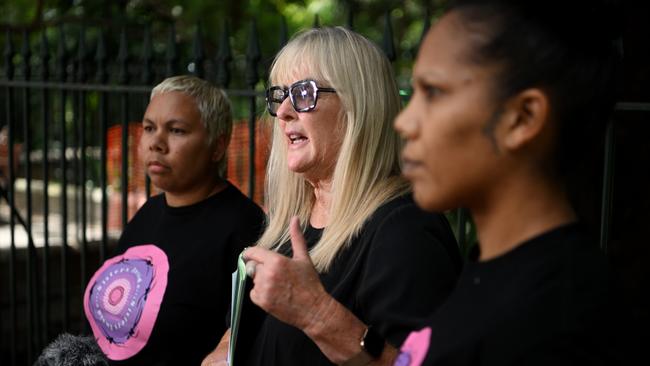NT Government to go ahead with mandatory sentences for domestic violence order breaches
Experts warn women and children will be at greater risk of being assaulted, jailed or killed as a direct result of the Territory’s proposed mandatory sentences for DV order breaches.
Experts warn women and children will be put in harm‘s way — assaulted, imprisoned and even killed — as a direct result of the Territory’s proposed mandatory sentences for domestic violence order breaches.
All of the 21 expert submissions to the CLP’s proposed changes to the Domestic Violence Act warned mandatory sentencing was expensive, would not reduce crime and would likely result in more women and children being harmed.
Despite this, Legislative Scrutiny Committee chair Oly Carlson confirmed the CLP would push ahead with the controversial domestic violence order legislation.
The legislation makes it mandatory to impose a custodial sentence if a person had committed three or more breaches of DVO in a 28-day period, if there had been a previous breach of an order, or when the breach of a DVO involves harm or a threat to commit harm to the protected person.

The Attorney-General’s department was unable to provide any data proving “usefulness” of mandatory sentencing in the NT, only saying the prison stints “may act as a circuit breaker and allow for victim support services to be put in place”.
Aboriginal organisations, community groups, legal and domestic violence services and experts all warned these expensive “circuit breakers” would ultimately result in more women and children being put at risk of harm.
Multiple submissions said the evidence showed release from custody often corresponded with increased risk of serious violence, including homicide.

The Territory coroner’s landmark domestic violence coronial inquiry stated “one of the most dangerous times for a woman experiencing domestic and family violence is the period just after the perpetrator is released from custody”.
“This is because perpetrators often blame victims for their incarceration,” Elisabeth Armitage said.
In their submission Her Story Mparntwe said even imprisonment did not always offer victims a reprieve from violence and abuse.
“Men often continue patterns of coercive control from within prison, through manipulation, jealousy and intimidation of their partners,” their submissions said.
The Central Australian Aboriginal Family Legal Unit and the North Australian Aboriginal Family Legal Service said this risk of violence was particularly felt by Aboriginal women who would be exposed to “payback” and retribution, and was one of the biggest reasons for First Nation’s woman to not report assaults.
All of the 21 expert submissions said there was no evidence that mandatory sentencing worked, indeed North Australian Aboriginal Justice Agency’s acting chief executive Anthony Beven said in Territory’s experience crime rates worsened under harsher sentences.
“The NT’s experience with mandatory sentencing for property offences provides a clear precedent — property crime increased while mandatory sentencing was in place and decreased following its repeal,” Mr Beven said.

The 2021 Northern Territory Law Reform committee report found that “short sentences do not provide opportunities for rehabilitation, and have negative effects on family, employment, income and housing”, leading to worse rates of reoffending.
Stopping Family Violence said for the cost of imprisoning an abuser in a Territory cell for 14 days — which costs around $455 a day — the Territory could fund the entire length of his stay at a men’s behaviour change program.
STV said unlike the NT prison’s 60 per cent reoffending rate, there was promising evidence for the men’s programs in reducing family violence recidivism and enhancing victim-survivor’s perceptions of safety.
All of the submissions warned that victims of violence would also be imprisoned as a direct result of the CLP’s DVO changes.

The National Network of Incarcerated and Formerly Incarcerated Women and Girls said mandatory sentencing would see victims being locked up for “defending themselves, acting under coercion, or being criminalised for poverty-related offences”.
“Mandatory sentencing treats all offences as if they occur in a vacuum, stripping the judiciary of the ability to consider context, coercion, and systemic factors that lead to criminalisation,” they said.
Australia’s National Research Organisation for Women’s Safety said research showed that a third of Aboriginal and Torres Strait Islander women killed by men in domestic homicides were “previously (mis) identified by police to have been domestic, family and sexual violence perpetrators”.
CAAFLU and NAAFLS said there was a “demonstrated patterns of misidentification of victims as perpetrators” within the Territory’s justice system.
The Northern Territory Women’s Legal Services — which includes Top End, Katherine and the Central Australia services — said women exposed to coercive control through DVOs were most at risk of being misidentified under the mandatory sentencing rules.
“Under a mandatory sentencing regime, judicial officers would have no choice but to sentence victims of coercive control to a sentence of actual imprisonment, even in the face of clear evidence that they have been misidentified by the justice system,” they said.
Instead the legal services called for greater education in the justice system about the red flags associated with DVO breaches, rather than the “blunt instrument of mandatory sentences”.
“Supporting judicial officers to better identify the gravity and risk associated with repeat and significant breaches of DVOs may lead to greater terms of actual imprisonment, than mandatory sentencing,” they said.
The experts instead called for the government to not impose mandatory sentences and to instead urgently implement the coroner’s 35 recommendations.
Despite the damning feedback, Ms Carlson said the CLP was still going to plough through with the mandatory sentencing changes, noting judges could use their discretion to impose a sentence community correction order subject to a home detention condition.
More Coverage
Originally published as NT Government to go ahead with mandatory sentences for domestic violence order breaches





